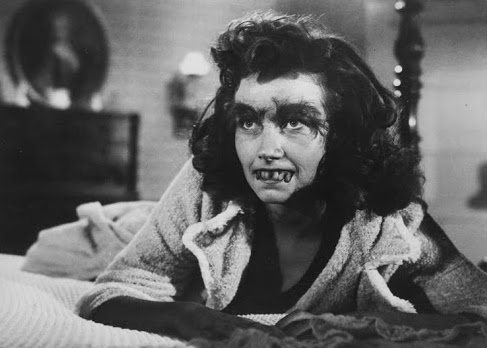
Frankenstein’s Daughter (USA, 1958) 85 min B&W DIR: Richard Cunha. PROD: George Foley, Marc Frederic. SCR: H.E. Barrie. MUSIC: Nicholas Carras. DOP: Meredith Nicholson. MAKEUP: Paul Stanhope, Harry Thomas. SFX: Ira Anderson. CAST: John Ashley, Sandra Knight, Donald Murphy, Sally Todd, Harold Lloyd Jr., Felix Locher, Wolfe Barzell, John Zaremba, Robert Dix, Voltaire Perkins, The Page Cavanaugh Trio. (Astor Pictures)

One of my favourite “bad movie moments” occurs at the beginning of this picture. Guy drives girl home, and walks her to her door, expecting to get some action. She bids him a good night, and he walks back to the car in disgust and leaves. Suddenly, she shrieks at the sight of a hairy, fanged woman-creature running down the street. Roll opening credits.
After a scene like that, we think we’re in for a wild movie experience, but sadly, this rather cardboard thriller never follows up. Despite how ludicrous this scene appears at first thanks to the caricatured posing of the actors, it actually works beautifully because it seems illogical, as nightmares truly are. Right after this scene, we go to the credits, and then this jarring prologue is simply explained away. Too bad.
For most of its remaining 83 minutes, Frankenstein’s Daughter is mostly tired exposition, in which subpar actors emote in front of some flimsy backdrops, lacking any kind of the strange beauty that we witnessed at the beginning. The premise, updating Mary Shelley to 1950s suburbia, is imaginative, but there is little flair in the execution. It is a deadly 85 minutes, and may have been okay at an hour long, since reels of mundane talk unspool before the feeble climax. Still, for all of that, this movie has strangely remained in the hearts of viewers for decades.
For some reason this thriller has a way of staying with you. Amusingly, the cardboard attributes of this film (the acting, the writing, and certainly, the art direction) actually compliment the material… if unintentionally. It kind of makes sense that these one-dimensional characters are in a production equally as threadbare. (I kept waiting for an actor to sneeze and blow one of the sets over.)
Despite the slipshod attempts at characterization or suspense, Frankenstein’s Daughter is actually interesting for its portrayal of sexual repression, circa 1958 middle class suburbia. The two girls, Suzie (who witnessed the weirdo creature in the opening) and Trudy (played by Sandra Knight- soon to be Mrs. Jack Nicholson) are portrayed as white-gloved good girls of the Sandra Dee School of Characterization, yet each become victims of a weirdo’s experiments. The true monster is not the “daughter” in question (in fact, one realizes, there is no such connection in the picture), yet a dour, somewhat aloof character who calls himself Oliver Frank (an anglicised version of…?). He is a live-in lab assistant for Trudy’s father, Carter (Felix Locher), -handy things, those basement science labs- who is putting in some extra-cirricular activity. It seems that he is injecting Trudy full of some weird drugs which turn her into the strange hairy beast in the film’s opening.
So far, this is a strange spin on the “Jekyll-Hyde” story (itself full of Freudian leanings), yet that somewhat diverting yarn is forgotten once Dr. Frank (Donald Murphy) gets his talons on his next victim, Suzie. We realize that the campy B horror violently grows up as Oliver Frank is revealed not only to be a sociopathic loser, but also a borderline sexual predator as his advances on Suzie (Sally Todd) result in her sudden death. Then, she becomes the next plaything in his laboratory. Soon, this attractive female becomes a horrible, stitched-together being which looks more male than female! (Indeed, the monster really was played by a man.) Interestingly, this case of sexual confusion stops right there.
This film is so low key that we take any jolts we can get, like the backyard performance of Page Cavanaugh and his rock n rollers. But no film with John Ashley can be all bad. The perennial star of hot rod epics is careful not to upstage anyone and acts just as one-dimensional as everyone else. But perhaps this blandness suits his equally bland character, Johnny Bruder. He is a preppy kid whose harsh yet soft-spoken demeanour tries to show everyone how much he is an authority on everything. (Look how he childishly berates girlfriend Trudy when she discusses the her strange dreams.)
Yet still, why do I want to see this movie again?
Updated from a review originally published in ESR #6, Summer 2002
